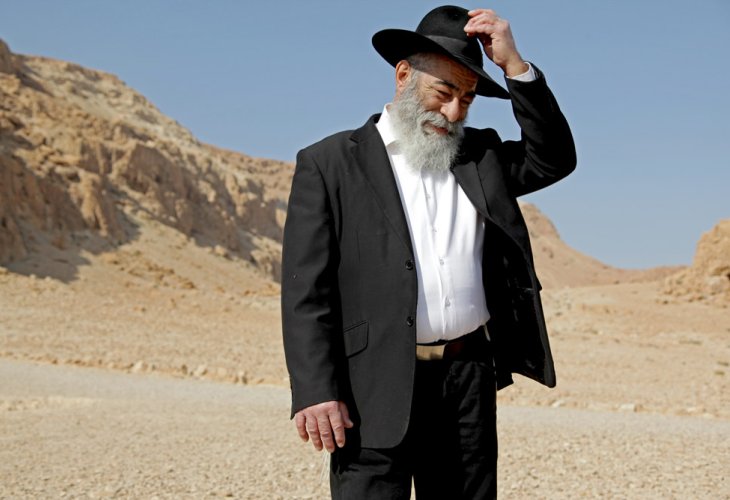Personal Stories
Ariel Zilber: Finding Hashem Between Songs and Silence
A famous Israeli musician shares how his soul awakened in Paris and brought him home to Torah and faith
- Dudu Cohen
- |Updated

This week on In Another Direction (Hidabroot Channel 97), the guest was none other than Ariel Zilber, an iconic Israeli musician, once known for his creativity in many musical styles. A former member of the bands Tamuz and Brosh, his music has spanned genres like rock, pop, Arabic music, hip-hop, and Ethiopian rhythms. He’s behind some of Israel’s most beloved hits, like “Run Shmulik,” “The Society for the Protection of Nature,” “Smoke Screen,” and “I’m Lying on My Back.”
Everything seemed to be going well for Ariel. He was celebrated, loved by mainstream culture, and successful in his career. But something shifted. During the painful days of the Gush Katif expulsion, Ariel spoke out firmly against the government’s actions. At the same time, something stirred deep within him, a pull toward Judaism.
Back then, I asked him during an interview, “You speak a lot about faith and Judaism, but I don’t see it in your appearance. Why not wear a kippah?” He answered, “The kippah doesn’t sit well on my hair.” But not long afterward, that changed too. His outer appearance began to match the inner transformation. He embraced a new path, becoming a Chabad chasid (follower of the Chabad Hasidic movement). His music shifted as well, fewer songs about lying on one’s back, and more about the Land of Israel, faith, and the journey in between.
Let’s go back a bit. Before your return to Torah, how did you relate to Judaism?
“We’re Jews. I always knew I was Jewish,” Ariel says. “But I had no connection with religious Jews. I remember walking around Nachalat Binyamin once, and this guy in a hat and kippah came up and said, ‘Come, we need a minyan (quorum for prayer).’ I said, ‘Are you crazy? What’s a minyan? Leave me alone.’ I ran away. I was afraid of him.”
And later, when you became religious?
“When I walked around in my new way of life, beard, tzitzit (ritual fringes), kippah, people were afraid of me. People who had known me before didn’t recognize me anymore. It was threatening to them.”
Why do you think it was threatening?
“It was the way I looked, but also Who stands behind me. Moshe Rabbeinu (Moses) stands behind me. Hashem stands behind me. That’s frightening. I come in the name of Hashem.”
To be honest, you weren’t the type of person I ever imagined would return to religion. Did you see it coming?
“I knew I was Jewish, and that was enough for me. I’m the son of a Jewish mother. The Bible was mine but more the Prophets and Writings than the Torah. I liked Genesis, stories about Adam, Noah. But the books like Exodus and Leviticus, with all the mitzvot (commandments), didn’t speak to me back then. The books of the Prophets, I loved them. I read them a lot.”
So you saw them more as culture?
“Not folklore,culture. Look at my songs and you’ll see a lot of biblical imagery. Even in ‘I’m Lying on My Back,’ there’s a strong moral message.”
Really? On the surface, it doesn’t seem like a moral song.
“Look closer. The song talks about someone lying on his back, watching the ceiling, wasting time, fantasizing, while life passes by. Life is beautiful like a play. But he’s doing nothing. It’s thought-provoking. That’s the point.”
Ariel shares that the real spark that began his journey back to Judaism was lit in Paris. “They made me a record there,” he recalls. “I was becoming a star, building a career. It was the 70s. I went to the studio, put on headphones, and a full orchestra started playing. I began singing in French. And suddenly I thought what, is this what I’m going to do for the rest of my life? Singing in French? Are these my songs? I said no, this isn’t for me. I took off the headphones, looked at the producer, and said, ‘I’m sorry, this isn’t for me. I’m going home.’ I was in my 30s. That’s when I understood I had nothing to look for outside of Israel. Until then, I was actually thinking of leaving the country.”
Were there any traditional elements in your life at that time?
“Who doesn’t have tradition in this country?”
But you were born on a kibbutz.
“Yes. We had a Seder night with both matzah and bread, and everyone just did what they wanted. It felt strange. My mother would tell me, ‘Forget it, these people here are crazy. Something’s not right.’ Back then, the kibbutzim ruled everything. They even had their own version of the Haggadah. I didn’t understand it, and I wasn’t interested. But my mother used to say, ‘This isn’t it.’ In Bible classes, they’d say the splitting of the sea was just a low tide and that it wasn’t Hashem. And my mother would tell me, ‘Don’t believe what they’re teaching you.’”
In the rest of the interview, Zilber talks about the media's disregard for him, about the song Amir Benayoun wrote about him at the time, about changing his lifestyle, and also about becoming a grandfather.

